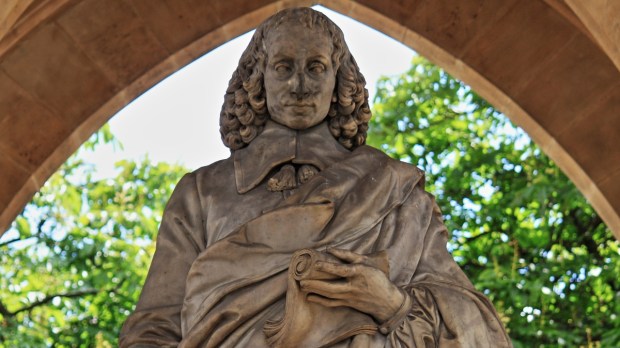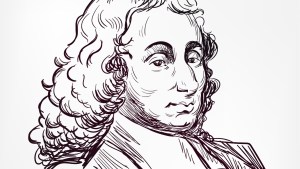On June 19, 2023, Pope Francis published an Apostolic Letter dedicated to the French philosopher Blaise Pascal (1623-1662) on the 400th anniversary of his birth. The 12-page letter, titled Sublimitas et miseria hominis – “The Grandeur and Misery of Man” in Latin – pays a tribute to this Frenchman, which the Pope, a former literature teacher, has referenced multiple times in his texts.
But who is Blaise Pascal and why does Pope Francis like him? Aleteia explains.
Pascal: a child prodigy who had a strong conversion experience
Blaise Pascal was born on June 19, 1623, in Clermont-Ferrand, a city in central France. From an early age he was considered a prodigy in several fields including physics, mathematics, and as an inventor. He invented, for example, the “Pascaline” an early mechanical calculator in the 1640s.
In his 20s he drew close to Jansenism, a heretical movement within the Catholic Church that wanted to reconcile divine grace with human freedom.
The movement was centered in the Abbey of Port-Royal in the southwest of Paris and was in conflict with many in the Catholic Church, especially the Society of Jesus. In Pascal’s text “Lettres Provinciales” (“Provincial letters”), which is a series of 18 letters written in the 1650s, he even took a vigorous defense of Jansenism against the Jesuits. This text was condemned by Pope Alexander VII in 1657.
In 1654 Pascal had a strong conversion experience he would later call the “Night of Fire,” which the Pope explains was when the philosopher lived an “experience of the love of God” in “Jesus Christ personally.”
In fact, Pascal wrote shortly after a text called “Mémorial” (“Memorial”), a brief prayer that he then sewed into his coat for the last years of his life. At a general audience in 2020, Pope Francis quoted this prayer : “God of Abraham, God of Isaac, God of Jacob, not of the philosophers and savants. Certitude, certitude; feeling, joy, peace. God of Jesus Christ.” He mentions this again in the apostolic letter.
After this conversion experience, the Frenchman started writing a text titled “Apology for the Christian Religion,” but was unable to complete it before his death. The drafts of this project were included in “Pensées,” a collection of his writings that was published posthumously in 1670. Pope Francis has said that this text is a “splendid and religiously interesting book.”
The Pope thinks of Pascal as a model to follow for his pursuit of truth
Pope Francis, the first Jesuit Pontiff, has repeatedly criticized a form of neo-Jansenism found in today’s Church, describing it in his Christmas greetings to the Curia in 2022 as a tendency to be “intransigent and unbending even in the face of ecclesiastical authority.”
However he has also recognized the original valid intention of this movement. In his Apostolic Letter, the Pope is careful not to resurrect this controversy, and acknowledges that Pascal was “sincerely” committed to opposing the Pelagianism of his time, meaning the heresy that holds that man can save himself alone. The Pontiff also insists that Pascal did not embrace Jansenist deviations, notably predestination.
In his apostolic letter, the Pontiff cites Pascal as a model for “everyone who wishes to persevere in seeking truth,” hailing a “man of prodigious intelligence who insisted that apart from the aspiration to love, no truth is worthwhile.”
He warns, however, against the temptation of reading the French philosopher as someone who wanted to impose his faith on others, for Pascal knew that “belief is possible only by the grace of God, embraced by a heart that is free.”
The Pontiff finds that Pascal was quick to grasp the “tragedy of this life” — the inability to see and thus avoid evil — and understood that faith could not be excluded from our search for goodness and truth. Recalling the Frenchman’s professional background, Francis believes that Pascal “speaks to our own times” as a rational mind — or “spirit of geometry,” as the philosopher put it — because he “reminds us of the grandeur of human reason and encourages us to employ it in understanding the mysteries of the world around us.”
Pascal evangelized using reason and patience
The Pope also explains that through philosophy, Pascal “sought as much as possible to engage in dialogue with those who did not share his faith,” as he chose to continue to rely on rational discourse. “Here we see a completely respectful and patient form of evangelization that our generation would do well to imitate,” Francis says.
The Pontiff praises Pascal’s care to avoid “disembodied reason,” where ideas are superior to reality. “The baneful ideologies from which we continue to suffer in the areas of economics, social life, anthropology and morality, keep their followers imprisoned in a world of illusions, where ideas have replaced reality,” the Pope explains.
“After applying his extraordinary intelligence to the study of the human condition, the sacred Scriptures and the Church’s tradition, Pascal now presents himself with childlike simplicity as a humble witness of the Gospel,” the Pope said. The Pope insists that the Frenchman knows that “divine revelation is not only not opposed to the demands of reason, but offers the amazing response that no philosophy could ever attain on its own.”
Pascal: a part of Pope Francis’ “spiritual constellation”
Blaise Pascal is one of the “great figures” who form part of Pope Francis’ “spiritual constellation,” suggested Cardinal José Tolentino de Mendonça, Prefect of the Dicastery for Culture and Education, at a press conference held at the Vatican to mark the publication of the apostolic letter. The Portuguese cardinal said the Pope is able to “quote from memory” many of the reflections contained in “Pensées.” The Pontiff particularly appreciates Pascal’s “honesty” and is a “profound admirer” of the man and mystic, the Portuguese Cardinal stressed, recalling the Frenchman’s special concern for the poor and sick at the end of his life.
Cardinal Mendonça added that Pascal is “a role model for dealing with the complexities of modern man.” The philosopher “helps to find paths of hope in the heart of man,” confronted with “the emptiness, the nothingness” of his time, the Cardinal highlighted.


